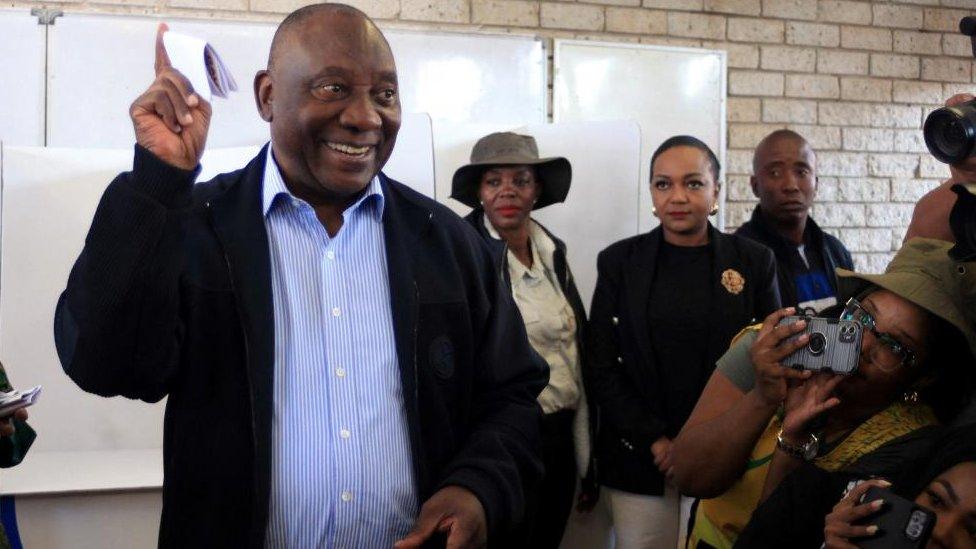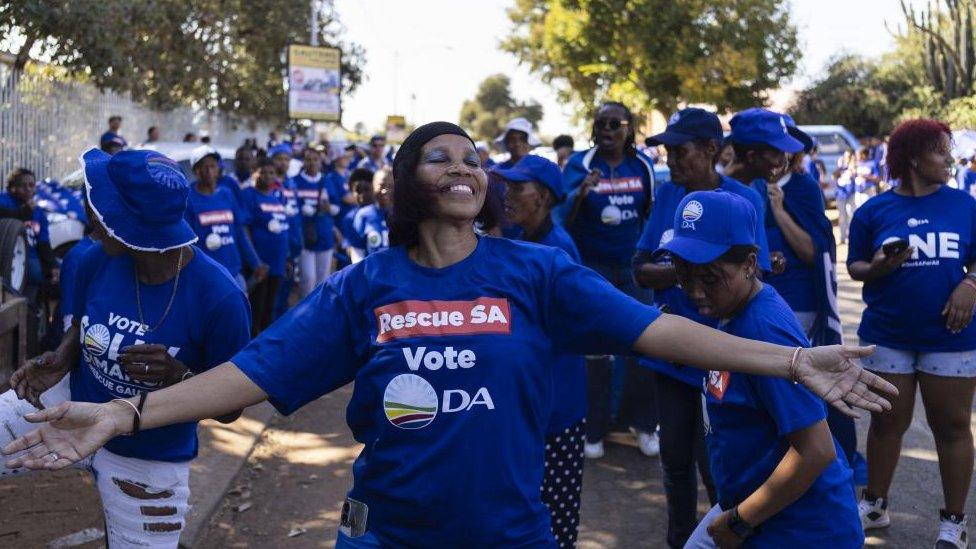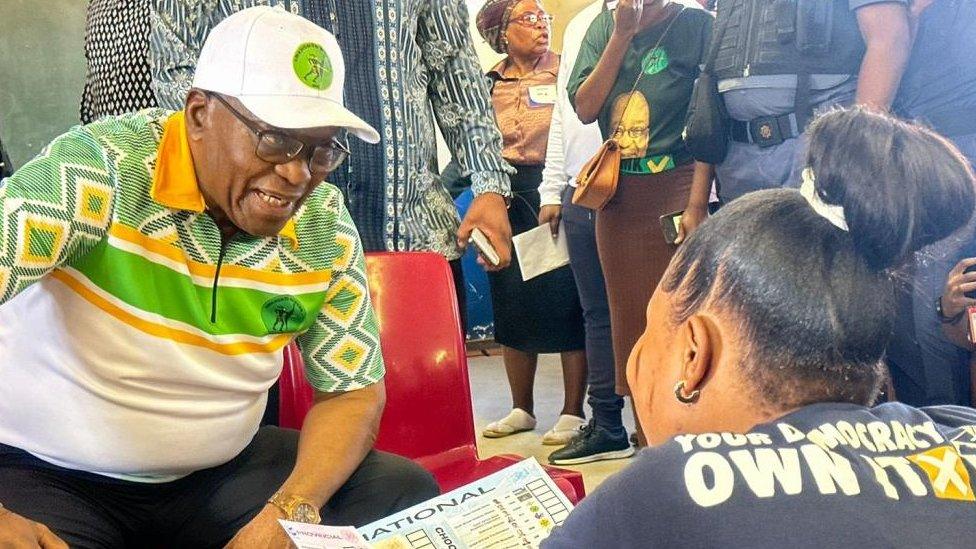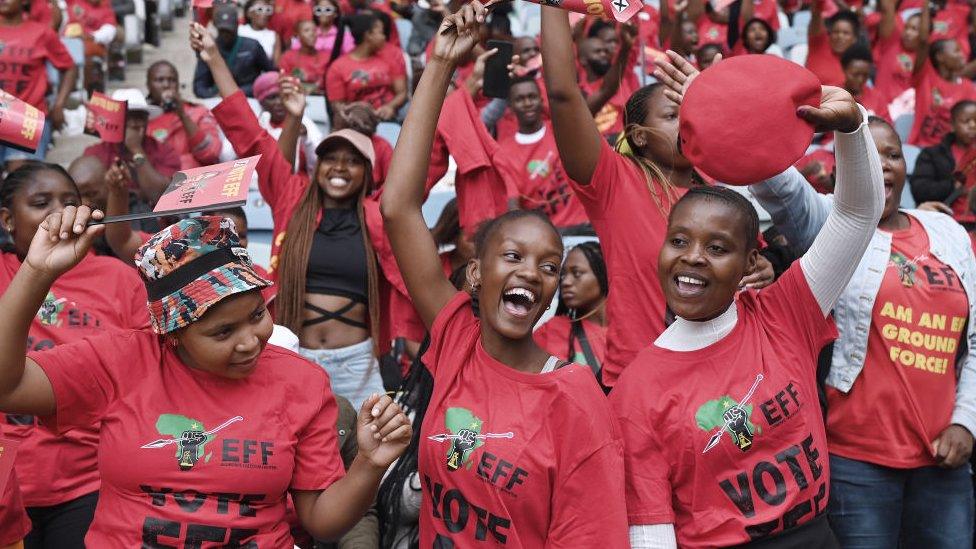South Africa election 2024: When will we know the result?
- Published

In the campaign President Cyril Ramaphosa said the ANC's achievements should not be forgotten
Almost all of the votes have been counted in South Africa after Wednesday's general election.
The governing African National Congress (ANC) has got just 40% - meaning it does not have a parliamentary majority for the first time in 30 years. It will now have to form a coalition with one or more parties.
Mounting criticism of the party that led the fight against apartheid under the late Nelson Mandela has chipped away at its support.
When will we know the result?
The electoral commission is expected to announce the final results at around 18:00 local time (16:00 GMT) on Sunday, but legally it has seven days to make the announcement. The count started as soon as polls closed on Wednesday and figures are being released as the tallying and verification in various areas is completed.
All of the votes have been counted and almost all tallied but the commission has until Sunday to deal with any complaints or objections.
South Africans have been used to knowing the result by the Saturday after polling day, but this time things are expected to take longer as there are more ballot papers to count because of the introduction of an extra vote for the national parliament.
What happened on Wednesday?
Wednesday's election saw long lines of voters outside polling stations late into the night across the country, with one electoral official in Johannesburg saying the queues were reminiscent of the historic 1994 election.
That was when white-minority rule ended and the ANC came to power. This was the country's seventh democratic general election.
Nearly 28 million South African had registered to vote and they were electing representatives to the national and provincial parliaments.
What is at stake for the ANC and what are its policies?
The ANC, now led by President Cyril Ramaphosa, was under growing pressure going into the election.
Stubbornly high unemployment, which hit 32% last year, persistent economic inequalities, corruption allegations and frequent power cuts have reduced its popularity.
High levels of violent crime - on average 130 rapes and 80 murders a day in the last three months of 2023 - have also dented confidence in the authorities.
But the ANC said it was working to fix these problems.
And it urged people not to throw away gains made since the end of apartheid. The party said poverty levels had fallen, a greater proportion of South Africans were living in decent homes and access to healthcare had improved.
The ANC promised to create millions more jobs over the next five years, to boost investment, support the private sector and end corruption.
What are the DA and EFF opposition parties offering?
The main opposition Democratic Alliance (DA) said the "country is in crisis".
It wants to liberalise the economy, including a move towards greater privatisation.
It has pledged to create two million new jobs, end power cuts and "halve the rate of violent crime".

The DA says it can save South Africa
To address unemployment and inequality, the Economic Freedom Fighters (EFF) - the third largest party in parliament - has radical economic solutions.
The party argued that the ANC had not redressed the racial economic imbalances of apartheid. It plans to redistribute land to the less well-off.
The EFF also wants to nationalise mines, banks and other key parts of the economy, arguing that the wealth of the country would then be used to benefit the majority of the population.
What about Jacob Zuma and the MK party?
Disgruntled former President Jacob Zuma - who was ousted by Mr Ramaphosa amid corruption allegations that he denies, and later jailed for defying a court order - is the leader of a fresh rival to the ANC.

Ex-President Jacob Zuma was campaigning as the leader of the new MK party
The uMkhonto weSizwe (MK) party, which took its name from the ANC's former armed wing, added further unpredictability to the race. It could make a strong showing, especially in Mr Zuma's home province of KwaZulu-Natal.
Before the election, the party saw off a court challenge by the ANC over the use of the MK name.
In a separate case, the country's highest court barred the ex-president from running for parliament. The Constitutional Court ruled that his 15-month prison sentence disqualified him. However, his image still appeared on the ballot paper.
In its manifesto, the MK party said the country took a wrong economic turn by pursuing market-led policies and that society was "adrift from its core values".
Who will be South Africa's next president?
South Africans do not vote directly for a president.
Instead they elect the 400 members of the National Assembly, who go on to vote for a new head of state within 30 days of the general election.

The EFF says that greater state control of the economy would create a fairer society
As a result, there were no presidential candidates as such, but each party leader fronted their national campaign and their portrait appeared on the ballot paper.
The ANC's President Ramaphosa, the DA's John Steenhuisen and the EFF's Julius Malema all featured prominently.
The leader of whichever party can muster a majority in the National Assembly after the election would be expected to become the next president.
How do general elections work in South Africa?
The proportion of seats that parties are allocated in the 400-member National Assembly is directly related to their share of the vote.
In 2024, independent candidates were included for the first time.
This meant that South Africans had three votes:
National parliament: One for 200 of the seats with just political parties named on the ballot
National parliament: One for the remaining 200 seats with a different ballot paper for each of the nine provinces, listing the parties in that region and independent candidates
Provincial assembly: One for the independent candidates or parties in the regional legislature.
How would a coalition be formed in South Africa?
The constitution does not spell out how a coalition could be formed if no party gets more than 50% of the vote.
But assuming the ANC remains the largest party, smaller groupings could informally agree to support an ANC government on a vote-by-vote basis in return for some concessions.
Or, at the other end of possibilities, the ANC could enter a formal coalition with some parties, including a written agreement outlining legislative plans and the distribution of cabinet posts.
Any other party would face the same choices.
An opposition coalition has also been mooted, though analysts say this is highly unlikely.
In a pre-election deal, a group of parties - led by the DA - signed up to what has been called the Multi-Party Charter for South Africa. If together they get more than 50% of the seats, they have already agreed to form a coalition. The agreement does not include the EFF or the MK party.

More about the election:
